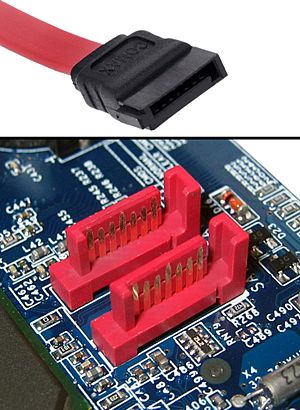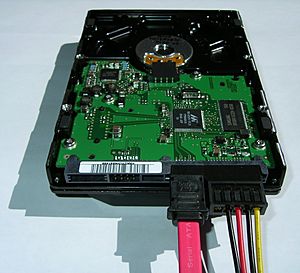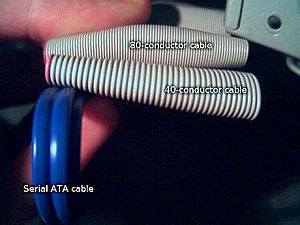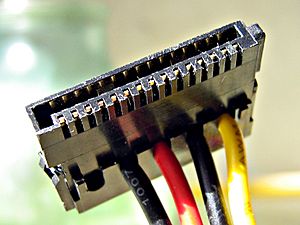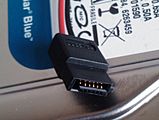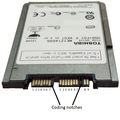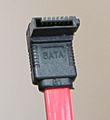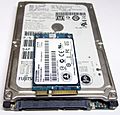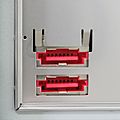Serial ATA facts for kids
Serial ATA (often called SATA) is a special way to connect storage devices like hard drives or DVD drives to a computer. Before SATA, computers mostly used an older system called PATA.
The biggest difference between SATA and PATA is the cables they use. SATA cables are thin and have seven wires. PATA cables are much wider and have 40 or 80 wires. Also, with SATA, each device gets its own cable. With PATA, several devices shared one cable.
Today, almost all desktop computers use SATA. PATA is mostly found in older industrial machines or special embedded systems.
Contents
How SATA Works and Its Speed
When electric signals travel on many wires close together, like in PATA cables, they can interfere with each other. This problem is called crosstalk. SATA avoids this by sending signals in a different, smarter way.
SATA uses a special code to send data. For every 8 bits of real data, it sends 10 bits. This helps make sure the data arrives correctly. The first SATA version could transfer data at 1.5 Gigabits per second (Gbps). This means it could send 1.2 Gbps of actual usable data. This was a bit faster than the last PATA standard. Newer SATA versions have doubled this speed many times. Remember, these are raw transfer speeds; the actual usable speed is about 25% lower.
SATA cables are also much easier to use than PATA cables. They are thinner and more flexible. Another cool thing is that some SATA drives can be plugged in or unplugged while the computer is still running. This is called hot swapping. Some drives also have a feature called "Native Command Queueing." This lets the drive smartly rearrange tasks to get things done faster.
Even the first SATA version was fast enough for regular hard drives. Hard drives have moving parts that read data. These parts are slower than the data transfer speed. So, the speed of the drive itself is usually the limit, not the SATA connection.
SATA Versions
As of 2016, there are five main versions of the SATA standard. Each new version is faster than the last.
| Official Name | Also Called | Usable Data Speed | |
|---|---|---|---|
| Gbit/s | Mbyte/s | ||
| Serial ATA 1.5 Gbit/s | SATA I | 1.20 | 150 |
| Serial ATA 3.0 Gbit/s | SATA II, SATA-300 | 2.40 | 300 |
| Serial ATA 6.0 Gbit/s | SATA III, SATA-600 | 4.80 | 600 |
| SATA Express 8.0 Gbit/s | 7.88 | 985 | |
| SATA Express 16.0 Gbit/s | 15.76 | 1,969 | |
SATA Express
SATA Express is a newer type of SATA. It uses a different, very fast way to send data, similar to how graphics cards connect to the computer. Modern solid state drives (SSDs) are super fast. They can sometimes use up all the speed of regular SATA III. SATA Express was made to give these super-fast SSDs even more speed.
How SATA Devices Work Together
Different versions of SATA usually work well together. This means you can plug an older SATA drive into a newer computer, but it will only run at the speed of the older drive. Likewise, a newer drive can work with an older computer, but it will be limited by the older computer's speed.
You can also use SATA drives with a special controller called SAS (Serial Attached SCSI). But you cannot use SAS drives with a regular SATA controller.
Computers can make SATA and PATA devices act the same way for the operating system. However, you can't physically plug a PATA drive into a SATA port, or vice versa, without a special adapter.
SATA Connectors
To use SATA devices, you need to connect them to your computer's motherboard. This is one of the most noticeable differences from PATA. SATA drives have two separate connections: one for sending data and one for getting power.
Sometimes, for external drives, both data and power are combined into one cable. But usually, you'll see two different cables and connectors. Some connectors even have clips to lock them in place so they don't accidentally come loose.
Power Connector
Standard Power Connector
Older PATA drives used a 4-pin power connector called Molex. SATA changed this. SATA power connectors look a bit like the data connectors but are wider. The standard SATA power connector has 15 pins. This is what you'll find on most 3.5-inch (desktop) and 2.5-inch (laptop) drives.
Smaller Power Connectors
Smaller devices, like some slim DVD drives, use a smaller 6-pin power connector. Even smaller drives, like those found in very thin laptops, use an 8-pin connector. These smaller connectors have a special shape to make sure you plug them in the right way.
Data Connector
Just like with power, there are different types of SATA data connectors for different uses. The most common one has 7 pins and is used for standard 3.5-inch and 2.5-inch drives. Other common types include mSATA and M.2 (also called NGFF). These are often used for very small SSDs.
eSATA and eSATAp
eSATA is a special version of SATA designed for connecting external drives. Its plugs and cables are stronger to handle being moved around. eSATA competes with other ways to connect external devices, like USB or Firewire.
Many external drives are actually regular SATA drives inside a case. If you connect them with USB or Firewire, the case needs extra parts to translate between SATA and the external connection. With eSATA, no translation is needed, which can sometimes make it faster.
There's also a version called eSATAp. This clever connector combines the pins for USB, SATA, and power all into one port. This means you can plug in either a SATA or a USB external drive with just one cable. Plus, this single cable also provides power, so you don't need a separate power adapter for the external drive.
Images for kids
-
Two SATA Express connectors (light gray) on a computer motherboard; to the right of them are common SATA connectors (dark gray).
See also
 In Spanish: Serial ATA para niños
In Spanish: Serial ATA para niños
 | James Van Der Zee |
 | Alma Thomas |
 | Ellis Wilson |
 | Margaret Taylor-Burroughs |


